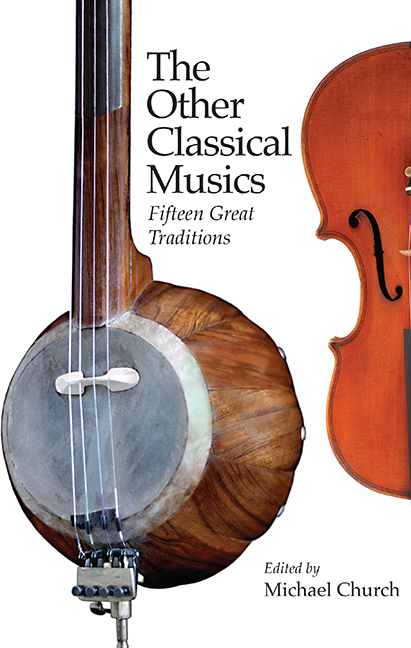Book contents
- Frontmatter
- Dedication
- Contents
- List of Illustrations
- List of Contributors
- Preface and Acknowledgements
- Introduction
- Maps
- 1 Thailand, Laos, Cambodia, Vietnam
- 2 Java
- 3 Japan
- 4 China: The Guqin Zither
- 5 Chinese Opera
- 6 North India
- 7 South India
- 8 Mande Jaliyaa
- 9 North American Jazz
- 10 Europe
- 11 North Africa and the Eastern Mediterranean: Andalusian Music
- 12 The Eastern Arab World
- 13 Turkey
- 14 Iran
- 15 Uzbekistan and Tajikistan
- Notes
- Bibliographies
- Index
7 - South India
Published online by Cambridge University Press: 29 May 2021
- Frontmatter
- Dedication
- Contents
- List of Illustrations
- List of Contributors
- Preface and Acknowledgements
- Introduction
- Maps
- 1 Thailand, Laos, Cambodia, Vietnam
- 2 Java
- 3 Japan
- 4 China: The Guqin Zither
- 5 Chinese Opera
- 6 North India
- 7 South India
- 8 Mande Jaliyaa
- 9 North American Jazz
- 10 Europe
- 11 North Africa and the Eastern Mediterranean: Andalusian Music
- 12 The Eastern Arab World
- 13 Turkey
- 14 Iran
- 15 Uzbekistan and Tajikistan
- Notes
- Bibliographies
- Index
Summary
Clad in traditional Hindu dress, a boy removes his shoes, approaches the shrine at the side of the stage and pays homage to a deity sitting garlanded under its canopy. Walking centre stage, making a bow with hands joined in salutation, he then takes his place in a little group seated cross-legged facing the audience, in the front of which are his family and teachers. The other musicians have been tuning their instruments: to his right the percussionist with the double-ended drum laid horizontally before him; to his left a violinist, instrument wedged between chest and foot so as to allow the left hand freedom of movement; behind him a woman gently strumming with one hand the four open strings of the long-necked drone lute. Now the young singer intones the first words of a prayer-song to the elephant-headed Lord Ganesa, the text composed by a sixteenth-century South Indian saint-poet. Against the background drone of upper and lower tonic and perfect fifth, the vocal line of the hymn is inflected and ornamented with little slides and oscillations: an affirmation of religious faith and poetic beauty. People in the audience call out their appreciation during the performance, and with hand-gestures mark the metre of the works the boy sings in his improvisation.
THIS is a South Indian arangētram, or ‘coming to the stage’: a debut performance for family, teachers and friends. The young artist's programme will have been prepared through years of study, and whether staged in India or abroad, this ceremony and its music are strongly redolent of the atmosphere of a Hindu temple. In stark contrast to the Muslim and Central Asian influences pervading Hindustani music, South Indian music's religious underpinning is everywhere apparent. In a famous scriptural passage, an ancient sage asks the God Vishnu how people may best come to know Him, and the God replies: ‘I dwell not in heaven, nor in the hearts of the Yogīs, nor in the sun. Where my devotees are singing, O Nārada, that is where I stand.’
In addition to its primary purpose as an artistic rite of passage for a boy or girl, in expatriate Indian communities the arangetram also makes a statement of cultural identity, and can be supported by musicians and teachers invited from India to take part.
- Type
- Chapter
- Information
- The Other Classical MusicsFifteen Great Traditions, pp. 160 - 177Publisher: Boydell & BrewerPrint publication year: 2015



